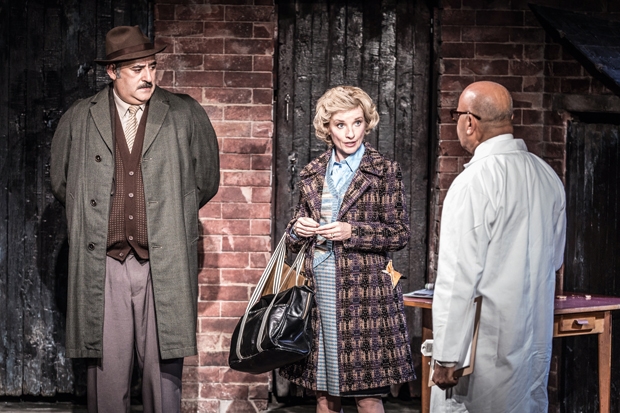David Baddiel has turned his movie, The Infidel, into a musical. The set-up is so contrived and clumsy that it has a sweetness all its own. A golden-hearted London cabbie, named Mahmoud, discovers that he was adopted at birth and that his real parents were Jewish. This strikes him as intriguing rather than alarming, and he starts to investigate Judaism with the sort of disinterested curiosity of a man taking up astronomy after inheriting a telescope and a star-chart from an eccentric uncle. Mahmoud wants an easy life so he keeps his secret from his wife, Saamiyah, and from his son, Rasheed, who plans to marry a girl named Ji-Ji whose father is a ranting Islamic bigot.
This is significant plot-wise because it means that the chief source of conflict, a potential bust-up between his son and his son’s fiancée’s dad, is at several removes from the main character. The lovers, Rasheed and Ji-Ji, are as flavourless as marshmallows and it’s impossible to care whether their romance blooms or dies. To write a musical comedy with a tedious love affair at its heart is quite a serious blunder. Clearly Baddiel doesn’t wish to be burned in effigy or to become fatwa fodder but he treats his Muslim characters so cautiously that they become bland and almost unbelievable. He’s more at ease, and much funnier, with the Jewish side of his story but here he may have overestimated his audience. A lot of the bar mitzvah jokes, and the Yiddish tags, will mystify those without an intimate grasp of Jewish culture.

Kev Orkian bumbles and grins nicely enough as Mahmoud, although he looks far too Anglo-Saxon to be either Muslim or Jewish. There are excellent performances from Steven Serlin as the Rabbi and from geeky blonde Melanie Masson in a variety of cameos. The hate preacher is given a lovely dash of hoity-toity campness by Alexander Andreou. The pivotal role of Lenny, a friendly neighbour who teaches Mahmoud about Judaism, is played by Andrew Paul (a stalwart of some cop soap), who turns in a decent performance. But the production would gain enormously from a specialist comedian who knows how to get laughs. The tunes are nice enough although I couldn’t hum any of them back after the show. And the lyrics might have been edited more ruthlessly. ‘Just because I read the Koran doesn’t mean I was trained in Sudan’ is a couplet that shouldn’t have reached the second draft, let alone the stage. Mahmoud whispers to us that he likes the odd cider, ‘but don’t tell al-Qa’eda’. How did that escape the red pencil? The press night crowd were on their feet whooping and cheering at the curtain call and yet I doubt if London has a large enough Jewish population to justify a West End transfer. If I were Baddiel, I’d take it to Broadway.
East is East offers a far more honest and bruising account of Muslim family life. Ayub Khan Din’s play, set in Salford in the early 1970s, features a mixed-race family, English mum, Pakistani dad, thrown into turmoil by the clash between European and Asian conventions. The father, George, terrorises his seven children and expects them to revere him like a feudal overlord. They call him ‘Genghis’. The mutiny begins when he orders his two teenage sons to marry girls from Pakistan whom they’ve never met. This will condemn them to a life of work, parenthood and responsibility, and deprive them of the parties and romantic dalliances they’re beginning to enjoy.

The long, slow revolt against their father’s authority unfolds with a gripping inevitability. Khan Din, who also stars as George, lays bare the patriarchal bigotry of his character but he also makes him sympathetic. George may be a touchy, tight-fisted dictator but he’s a loyal, hard-working parent who, in his own way, wants to help his children. His worst crime is to apply the morals of the 1930s to the 1970s.
Every character offers great opportunities for actors. Michael Karim puts in a starry performance as the youngest kid, Sajit, a snarling loner who lives in the coal shed, and refuses to take off the stinky old parka he’s been wearing for years. Taj Atwal, as the manipulative and devious Meenah, is a treat to watch. Jane Horrocks’s blonde hairdo, stiffened into peaks like beaten egg whites, deserves a standing ovation of its own. She’s in great form as the stroppy, slovenly matriarch who serves her kids biscuits for breakfast and who retains a perverse but genuine fondness for her bullying husband. This play is one of the gems of the theatrical repertoire, and Sam Yates’s production is pretty near flawless.







Comments